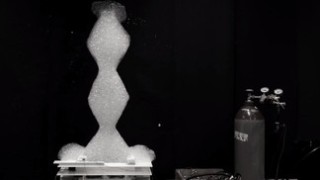Apr 6 2015
Shih-Yuan Wang and Alex Barchiesi from EPFL's Sinlab create structures that, while controlled by machines, are also subject to external influences. Their research challenges art and science.

"When we model soap foam, its shape is not only influenced by our machine, but also by the environment’s temperature, maybe the wind or even the spectators touching the soap structure," explains Shih-Yuan Wang, doctoral assistant at the Media and Design Laboratory. With Alex Barchiesi, who describes himself as a "creative physicist", he experiments all kinds of "living materials". Both researchers have built structures that are poetic and ephemeral at the same time. In addition to the soap foam columns, they have also worked on fumes directed by sounds and on a type of 3D printer that uses sodium acetate as a consumable, which forces the robot to adapt its construction to unpredictable deformations of the material.
"For our next project, we'll use some intelligence in the matter," said Alessandro Barchiesi enigmatically. "But it is too early to say anything else." All this research takes place at Sinlab, the result of a partnership among EPFL, la Manufacture (higher education school of drama), Zurich University of the arts, Munich’s Ludwig Maximilans University and Tsinghua University. This laboratory tests the boundaries between living arts, architecture, engineering sciences and philosophy. "Culture is often considered as not being a part of science. But in fact, first there were human activities and then they were circumscribed by arbitrary boundaries. That is what we want to question. We want to push the boundaries."
Renew architecture
Researchers want to question architecture by building unpredictable structures. "The evolution of architecture has become so slow! We are trying something completely new to make things happen, to expand architecture’s horizons. "This is art’s role: to question and disrupt".
Shih-Yuan Wang will be presenting their work at the MRS Spring Meeting & Exhibit in San Francisco, a convention of the Materials Research Society, starting today. There are other trips planned, especially in July in São Paulo for the CAAD Futures conference (computer-aided architectural design future). However, during these conferences it is impossible to carry out the performances conducted at Sinlab. For instance, creating foam columns requires fairly substantial equipment; apart from the computer controller, the equipment consists of a compressor and a gas cylinder since the foam is in fact produced using helium.
Transient Materialization: Ephemeral Material-oriented Digital Fabrication
Even though Shih-Yuan Wang is an architect, his experiments with living materials have forced him to become a jack-of-all-trades and to study information technology in particular to develop the controllers of the machines they produce. For his part, Alex Barchiesi studied particle physics at the University la Sapienza of Rome, the Fermi Institute of Chicago and the Paul Scherrer Institute. He has also collaborated with the European Space Agency as well as CERN. He now holds a senior position in GARR, the Italian research institute on networks, cloud computing and distributed storage architecture. His artistic work has allowed him to exhibit and teach in various institutions such as the University La Sapienza and the Pompidou Center in Paris.